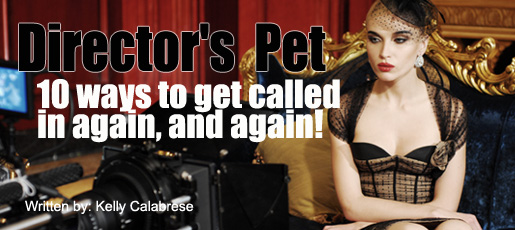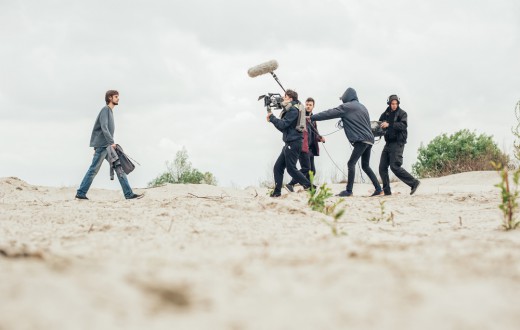Auditions are often called the toughest job interview in the world, and with good reason. You’ve got a little more than a minute to make an impression and show the casting team that not only do you have the acting chops and the look for a certain role, but also to demonstrate your own personality.
A tall order indeed!
But there are ways to impress a casting director and ensure that your audition will stand out from the rest. Of course the main key to getting cast is to do the work: learn the lines and develop genuine and appropriate objectives for the character. And there is also a certain amount of luck involved with auditions–you have to have just the right look and the right energy for the role.
But that’s a given. Which leads us to the perennial question actors ask about casting directors: What do they want?
Of course, trying to read minds is a bit of a trap. However, it’s safe to say that there are a few things every casting director is looking for. Here are a few ways to help you make a lasting impression at your next audition.
1. Think different
Generally casting directors get into the business because they love actors and they love acting. But try to imagine the tedium of watching several hundred actors up for the same part, all reading the same sides in the exact same way. No wonder these guys and gals are caffeine addicts! So rule number one is to find a way to stand out from the crowd. We are of course bound by the text. There are certain broad strokes in any given script that dictate actors’ choices, some of which make more sense than others. But within those parameters is a whole range of smaller choices that can set you apart from the herd. Is there an angry moment? Try ratcheting the volume down instead of up. Or raise your volume for a moment in an unexpected place. Is there a sad farewell? Try smiling through the pain instead of dredging up tears. Pronounce a particular word in a weird way or use a strange intonation. Use your creativity to find something, anything that runs counter to the simplest, most basic reading of the text. Because you can bet that the majority of the other actors up for the part have already beaten those choices to death. It’s on you to find a way to get casting director’s attention somehow and wake them up!
2. Present and accounted for
We talk all the time about how challenging and difficult auditioning is: you only have a short amount of time to make an impression, and sometimes things like nerves, the stress of your day, or being hungry or tired can get in the way of you doing your best work in that tiny window. But you’ve got to find a way to push all that aside when your name is called and you enter the audition room. Easier said than done, right? But this is where you’ve got to bring to bear all your training in being grounded and in the moment. The simplest and most reliable path to ensuring that you can be as present as possible is using your body to focus your mind. When you’re thinking about the physical nature of your body, it can help prevent your mind from running away with itself. Do some deep breathing shortly before your read, or try stepping out into the hall and doing a few quick push-ups, or even just stretch and touch your toes. And when you’re in the audition room and about to read, the temptation is to rush right in, but don’t do it. Take a moment to draw in a deep breath and really feel your body. Think about your feet being on the solid floor beneath you, feel the warmth or chill of the room on your skin, and feel your respiration go all the way down to the bottom of your lungs. Take a long moment to breathe deep and fully inhabit yourself and think about nothing but your physicality. And when you expel that breath, imagine yourself expelling all your tension with it. And begin.
3. You’re so spontaneous
One of the biggest challenges for the actor is to be fully prepared, having learned the text and having a clear arc through the scene, yet to present this in such a way that it appears to be happening in real time. Well, duh, you say; that’s the job. However, do keep in mind that there is such a thing as being over-prepared. When you learn sides or a monologue it’s easy to lock in certain choices–a pause here or a shift in volume there, for instance. But you’ve got to remain open to whatever is given to you in the moment in order to fully engage with the character and what is happening to them. Many times you will hear less experienced actors complaining about the reader–he or she “didn’t do it right” or something to that effect. This is exactly the wrong attitude. Whatever your scene partner gives you, whether it’s what you expected or the same read as your roommate who ran the scene with you the night before, it’s your job to react to it in the moment. Believe me, casting directors are well aware of any limitations their chosen readers bring to the table. Wishing for someone or something different from them is a waste of time. It’s up to you to spin that straw into gold by reacting in a genuine, lively way to what you’re given, no matter what it is.
4. Confidence game
As less-experienced actors we all had auditions like this at one time or another: you felt great, well-rehearsed, completely solid about being off-book, 100 percent ready to go–right up until the moment you were called in to read. Then your heart began racing, your breathing accelerated, your mind began darting all over the place, and everything promptly went to hell in a stuttering, awkward, sweaty little handbasket. Insecurity and nervousness happen, of course. But let’s face it: directors want to work with people who are secure in themselves, and confident in what they do. There’s no substitute for experience when it comes to giving you confidence. But one useful and well-known shortcut to confidence is to behave as if you are confident already. And a neat trick to implement this in the context of the audition is not to think about your own nervousness and controlling it when you get in front of the casting team, but rather to walk in with the mindset that your first job is to help THEM to relax. Make eye contact and smile and say your hellos in a clear, loud voice. Shake hands if it’s offered, and make a little small talk as you get yourself situated to read. Remember, this is fun! It’s called PLAYING a role. And, barring some freak accident or sudden natural disaster, you are not going to die here, no matter how it goes, so there’s really nothing to be afraid of. Acting is what you love, and you really do know what you’re doing–so act like it! Show them the love and the joy and the sense of play that you bring to your craft, and you will book more roles, guaranteed.







